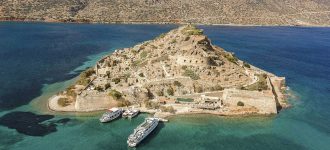
The Greek Orthodox Christmas traditions have different secularization elements compared to international customs; for example, Santa Claus (as in Saint Nicolaus) doesn’t come the night before Christmas, but on December 6, the feast day of Saint Nicholas of Myra, the patron saint of sailors and children.
Here are other Christmas customs unique to Greek islands and Crete.
Karavaki – Christmas Boats
Spruce, pine, or fir trees grow scarcely on Greek islands, although they are common to the northern part of the country in regions like Sterea and Peloponnese. For this reason, islanders began decorating boats with lights and marine elements. Although modern international influences make the Christmas tree a common occurrence now, Christmas boats, or karavaki, still line up the coastlines, at the main entrance of fishing villages, on beaches, and even in busy towns.
Karavaki boats are also a tribute to the sea and its seafarers and a homage to St. Nicholaus.
Agios Nikolaos and Agios Vasileios Instead of Santa
The modern culture, Santa borrows his identity from several legendary figures. His name derives from St. Nicholas (Agios Nikolaos in Greek). Still, he also has similarities with the English figure of Father Christmas, the French Père Noël, and the Dutch Sinterklaas (a legendary figure based on Saint Nicholas of Myra). The name Santa Claus is a phonetic deviation from the Dutch Sinterklaas.
As already mentioned, children in Greece receive little presents – sweets and fruit – on December 6, the feast day of Saint Nicholas of Myra. But international influences forced parents to deliver gifts on December 25, too.
Agios Vasileios is the Greek equivalent of Santa Claus. He comes down the chimney, not on December 25 but on New Year’s Eve.
So, Greek children will receive gifts on December 6, 25, and 31. Nevertheless, Greeks rather focus on quality family time, the true spirit of giving, and helping those in need.
Kalanta Xristougenon (Christmas Carol)
It’s not uncommon to see carolers in the streets or going from door to door at Christmas time. Many countries have this tradition. However, Greek kalanta (or kalanda) are unique because they date back to Byzantine times and are still sung in an old language, accompanied by drums and triangles.
Children gather on Christmas Eve morning with their drums and triangles, sometimes carrying small karavaki boats. Then, they go from door to door, visiting every household and shop in the village to wish for health, happiness, and prosperity. Before caroling, they ask, “Na Ta Poume?” (Shall We Sing?) and the hosts nod in approval. Carolers are rewarded with sweets, fruit, or small amounts of cash at the end of a kalanta.
Christopsomo – Christ’s Bread
Christopsomo (Christ’s Bread) is a sweet bread with sugar, honey, sesame seeds, almonds, and walnuts, flavored with orange, mastic, vanilla, cinnamon, cloves, mahleb, and anise. These spices may vary from household to household; however, mahleb and anise are common in all recipes. The bread is baked on Christmas Eve. On Crete Island, while kneading, the baker repeats a few times, “Christ is born, the light rises, so the yeast will come alive.”
Christopsomo has a cross decoration in the middle, and other motifs made of dough, like grapes, wheat, olive branches, etc.
Christmas Sweets: Melomakarona and Kourabiedes
Melomakarona are kourabiedes are traditional Christmas sweets.
Melomakarona are cinnamon-flavored honey cookies, soft, moist, and flavorsome – full of intense aromas of cloves, cinnamon, and nutmeg. At Christmas, you will find them in every household in Crete. Bakeries and shops begin selling melomakarona in early December to give people enough time to enjoy them.
Kourabiedes are made with flour, butter, almonds, and powdered sugar, like the Arabic kurabiye sweets. After baking, they are generously dipped in powdered sugar, so they look like small snowballs.
Besides these traditions, you should also know that the Greek Christmas is preceded by a 40-day fasting period – the Christmas Lent – when people abstain from certain foods and drinks, including meat, fish, dairy products, eggs, olive oil, and wine. Some of these foods are allowed on certain days – for example, people who fast can consume fish, oil, and wine on Saturdays and Sundays.




